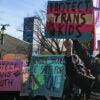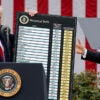With midterm elections underway in Texas, the fight over voter ID will undoubtedly garner some serious attention in the national media in the coming weeks and months. Ten states will require voters to present photo ID when voting in this year’s midterms, despite vigorous attacks from liberal opponents and the Obama Administration.
A favorite claim made by those who oppose voter ID is that voter fraud is a rare occurrence. On the surface, this argument may have some appeal, because it is not very often that huge voter fraud conspiracies dominate the national headlines. But, by its very nature, voter fraud is hard to detect.
It becomes even harder to catch when there are virtually no safeguards in place to defend against it. It is particularly troublesome in close elections—especially on the local level, where outcomes are often determined by a handful of votes. Taking reasonable security precautions is just common sense: You don’t wait for your house to get robbed before locking your door at night.
Moreover, there is rock-solid proof that voter fraud is occurring in America. Here are just a few recent examples:
- An NBC station in Fort Myers, Florida, just aired a report about the many non-citizens it caught voting illegally.
- California state Senator Roderick Wright (D) was recently convicted of eight felony counts of voter fraud and perjury for acts that were committed in five different elections. California Senate Democrats voted down a resolution calling for Wright’s expulsion from the Senate. Instead, Wright is currently on a paid leave of absence pending appeal of his conviction.
- Last year, Ohio poll worker Melowese Richardson was charged with eight counts of voter fraud and was sentenced to five years in prison.
- A criminal investigation in Iowa recently turned up 80 cases of potential voter fraud that have been referred to prosecutors. Over the past year-and-a-half, five people in Iowa have been convicted of voter fraud, and charges are pending against 15 others. Many recent legislative races in Iowa were decided by fewer than 100 votes, 10 were decided by fewer than 50 votes.
- A similar report by a Philadelphia city commissioner in 2012 chronicled multiple instances of voter fraud in the form of impersonation, double voting, and voting by non-citizens.
Another favorite attack by opponents of voter ID is that it’s a racist, discriminatory measure intended to suppress voters who traditionally vote for Democratic candidates. However, the actual turnout from states with voter ID clearly demonstrates that this claim is untrue, including in Texas.
In a recent speech, Vice President Joe Biden denounced voter ID laws for their “hatred.” Are government offices (including the Department of Justice in Washington), banks, bars, airlines, and drug stores racist and hate-filled for refusing entry or service to those without a photo ID? Potential employers won’t hire someone who cannot prove their identity; in fact, that is a requirement of federal law. Banks will not deposit a check without first seeing some form of valid ID. A photo ID is even required in order to receive many public benefits, such as health insurance.
Voter ID is just another common sense requirement in a world where photo identification is required for nearly everything. And it is only one of the measures, albeit an important one, that should be taken by election officials to secure the integrity of the election process.
Peter McGinley is currently a member of the Young Leaders Program at The Heritage Foundation. For more information on interning at Heritage, please click here.
































One Reply to “Voter ID: Protecting the Integrity of Our Elections”